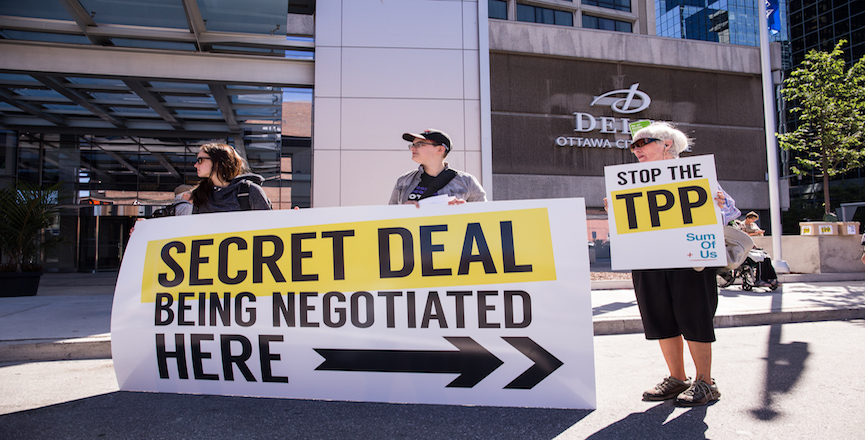Justin Trudeau has broken his election promise of consultation and transparency with the ongoing Trans-Pacific Partnership (TPP) talks.
On October 5, 2015, just two weeks before the last election, Trudeau responded with this statement to the Harper government’s announcement that it had reached agreement with eleven other countries on a Trans-Pacific Partnership deal.
He said,
“The Harper Conservatives have failed to be transparent through the entirety of the negotiations — especially in regards to what Canada is conceding in order to be accepted into this partnership. The government has an obligation to be open and honest about the negotiation process, and immediately share all the details of any agreement … If the Liberal Party of Canada earns the honour of forming a government after October 19, we will hold a full and open public debate in Parliament to ensure Canadians are consulted on this historic trade agreement.”
Consultation
Yes, the federal government held a public consultation on the TPP in 2016, but according to Global Affairs documents obtained through an Access to Information request made by The Council of Canadians, only two out of more than 18,000 Canadians wrote to the government’s email address in support of the TPP. That means only 0.01 per cent of those who participated in this email consultation supported the deal.
And yes, the House of Commons Standing Committee on International Trade did hold public hearings on the Trans-Pacific Partnership between February 2016 and February 2017. But NDP MP Tracey Ramsey has highlighted, “It is worth noting that every individual who spoke at the public participation sessions expressed concerns with the TPP and in most cases opposed the agreement outright.”
Despite this overwhelming public opposition, the Liberals have clearly chosen to pursue a TPP agreement.
Then with great audacity, the Liberals announced an online consultation to be held between September 30 and October 30 on “trade throughout the Asia-Pacific” including “with the remaining members of what was the Trans-Pacific Partnership”. Those results have not been made public either, but Canadians would be forgiven for not participating in such an obviously meaningless process.
Transparency
And now we read in the news that a TPP-11 agreement was thought to have been reached in principle. While International Trade Minister François-Philippe Champagne assures us via Twitter that there is no agreement in principle, New Zealand’s trade minister has now publicly stated that Canada did not object to the agreement in principle that ten countries thought they had reached yesterday.
The New Zealand Herald reports,
“The fact is that Trade Ministers from 11 countries thought they had reached agreement late last night and had all but broken out the rice wine when, like the Best Picture blunder at this year’s Oscar, someone said there had been a terrible mistake. One country, had misunderstood a part of the agreement and there was no agreement. [New Zealand trade minister David] Parker also made it clear that it was not [New Zealand nor] Canada either – despite its Trade Minister taking to Twitter last night to contradict reports from Japan’s Trade Minister that an agreement in principle had been reached.”
It is still not clear what country objected, or what it objected to, or what the other ten countries — including Canada — did agree to.
But wait, there’s more!
Now the CBC reports, “A spokesperson for the prime minister said there is simply no consensus between the 11 member countries at this time. ‘We made progress but, as we said coming in, there is no rush to conclude. There are outstanding issues for more than one country. One of those countries is Canada.'”
So in this version of events, Canada does have objections.
The CBC article notes, “Canada has two major sticking points with TPP, including passages on intellectual property rights and cultural exemptions. Trudeau said Thursday Canada must maintain the right to regulate, and financially support, the country’s cultural industries and not fear retribution at a trade tribunal.”
Just a few days earlier the Canadian Press had reported on three sticking points.
That article noted, “A senior government official says Ottawa’s negotiating team is seeking modifications to the original TPP deal in many areas — but primarily in the intellectual-property provisions [related to patents, copyrights and trademarks], its approach on cultural exemptions and Canada’s supply management system for dairy, poultry and eggs.”
Notably not on this list of either two or three objections is a firm refusal to agree to the controversial investor-state dispute settlement provision.
The Liberal government has failed to adequately consult Canadians and Indigenous peoples on the TPP, failed to listen to what the vast majority of people have told them about this deal, failed to be transparent, open and honest about the TPP-11 talks, and should immediately withdraw from the TPP-11 negotiations.
This blog originally appeared on The Council of Canadians’ blog.
Image: SumOfUs/flickr
Like this article? rabble is reader-supported journalism.




